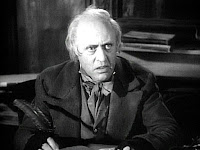Gift Challenge #4 Most of us think of A Christmas Carol as a morality play; actually, it is a political stance. Dickens’ play attacks a popular Victorian thought: to feed the poor would only encourage reproduction to take advantage of the extra food. This thought, known as Malthusian, named for the British social thinker Thomas Malthus.
Most of us think of A Christmas Carol as a morality play; actually, it is a political stance. Dickens’ play attacks a popular Victorian thought: to feed the poor would only encourage reproduction to take advantage of the extra food. This thought, known as Malthusian, named for the British social thinker Thomas Malthus.
In the book How to Read Literature Like a Professor, author Thomas C. Foster explains the history:
The photo above depicts my favorite Scrooge, actor Alastair Sim.Dickens caricatures this Malthusian thinking in Scrooge’s insistence that he wants nothing to do with the destitute and that if they would rather starve than live in the poorhouse or in debtor’s prison, then, by golly, “they had best hurry up and do it and decrease the excess population.” Scrooge actually says that. What a guy!

7 comments:
Gee, thanks for sharing that insight with us. As a science teacher, I am familiar with Malthus and his exponential growth theory. I'm adding Foster's book to my list.
I'm really enjoying H2RLlaP, although the title makes me feel I'm reading a Lit for Dummies. ;D
Foster uses books I'm familiar with for his examples and he has a sense of humor, a plus for "How to" books.
I have always liked "A Christmas Carol". It has a message that stands the test of time. :)
I haven't read a lot of Dickens, but what I have read seems very much to be politically motivated.
I agree with you about Alastair Sim - he's my favorite Scrooge, too!
Paul & Ex Libris, Foster writes that most political works, don't stand the test of time, but A Christmas Carol still influences change; although, we miss his original meaning. Unfortunately, greed as a theme will never cease its need for exploration through the written word.
Ex Libris! I’m a snob! I refuse to watch other Carols, although I like Scrooged with Bill Murray! :D
To bad it didn't have much impact two years after original publication was the Irish potato famine. Suffice it to say the government did not adequately deal with the situation.
Jlmnman,
I read in Black Potatoes by Bartoletti that most of the British had no idea or didn't believe their neighbors' situation was so bad. They even had food stored that would have seen the Irish through.
Very sad, but I'm a product of the great migration to America. ;)
Post a Comment